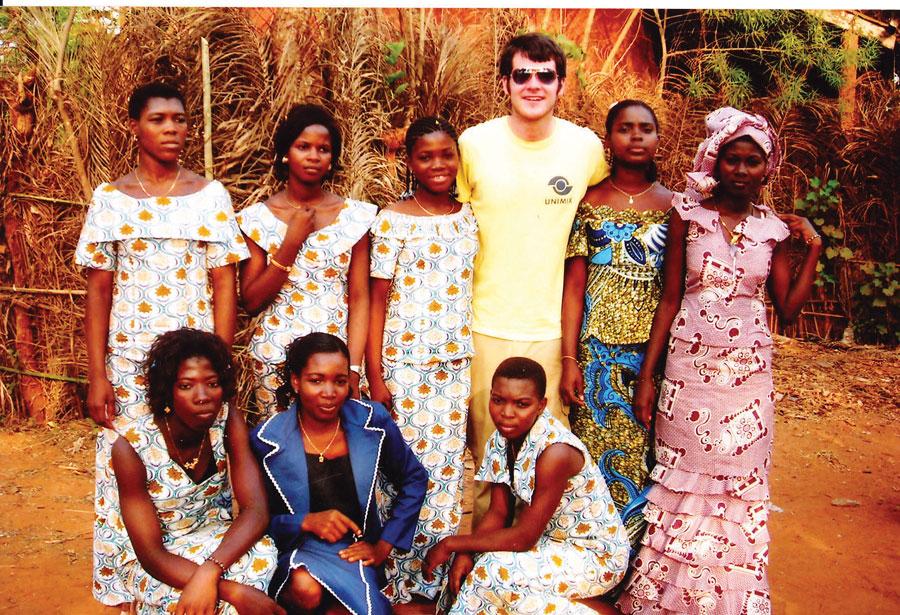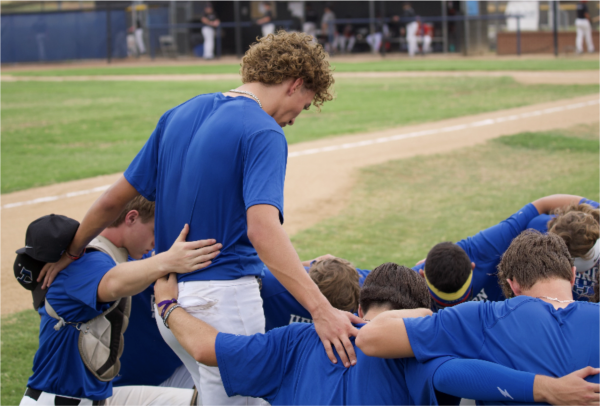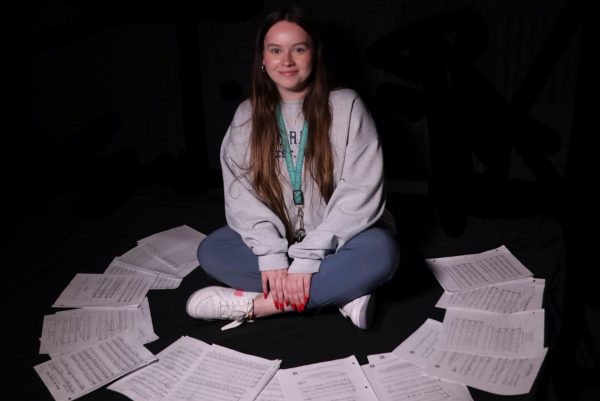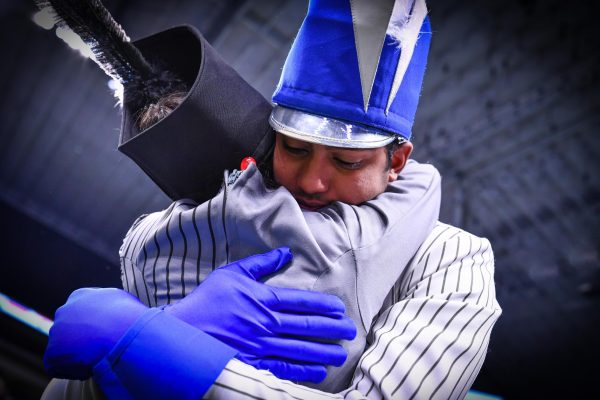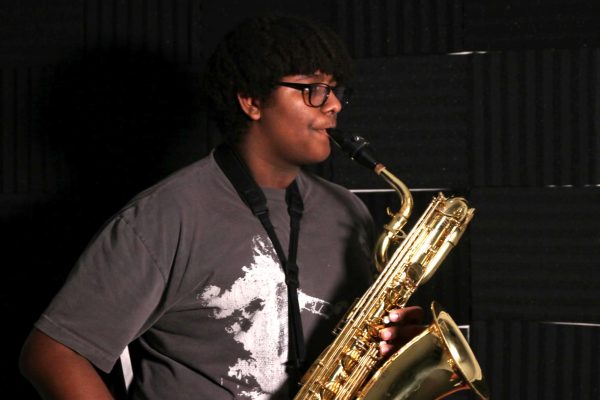Former peace corps volunteer changes focus to classroom
The alarm was set early, the coffee on auto-brew. Waking up near dawn to give a student before-school tutorials is just another part of the job. But starting out the day being stood up by a student did not come in the description. It’s days like these that Government teacher Travis Fitzgerald pulls out his wallet from his back pocket and peers inside. He fumbles past some bills and tugs out a white index card, signed and dated by a former student.
He places the notecard on the desk in front of him and unwraps the bent corners like a present. Unfolded and spread out flat, the card reads, “I don’t know why or what you do or say to me but when I’m not working you always make me want to work! We need more teachers like you!”
And that’s what he needs. When a lesson flops and his students miss the concept or when he’s the last one to leave the building, overworked and exhausted, it reminds him of the good times, the impact he’s still able to make in his class.
“I keep that in my wallet for when things are bad, to remind me why I got into this gig in the first place,” Fitzgerald said, “It’s precious to me. That’s kind of why I do it.”
Fitzgerald, called Mr. Fitz by his students, admitted that teaching is the only thing he considers himself good at. It’s been an unusual journey to his own a classroom, though.
Discovering Government
Fitzgerald graduated from the University of Oklahoma in 2004 with a political science and history degree. He managed to find a job working at the Oklahoma State Capitol in the governor’s office, writing stories about bills that were being considered in Congress.
He had other goals and desires as well, such as seeing the world. He was eager to help people and gain experience.
Working in the Oklahoma State Capitol was both fast paced and a slow tread. Over time, Fitzgerald began to see the government as it really is – often corrupt and unforgiving.
“The institution of government itself isn’t necessarily the root of all of our problems,” Fitzgerald said. “It’s our corrupt human nature.”
Fitzgerald started working toward a diplomat position. He succeeded in the first portion of the job interview, and then flew out to Chicago for the second portion, the face-to-face evaluation, where it was decided that Fitzgerald did not have enough experience in a foreign country to work as a diplomat.
Walking through the streets of Chicago, Fitzgerald felt like he had hit a brick wall. It was the first real setback he faced in his career. He remembers thinking that he had not yet thought of a backup plan. Looking back now, he realizes that being a 23-year-old state diplomat is just too young.
“I had the knowledge, I knew how government worked, but I needed the experience,” Fitzgerald said. “So I thought, I’ll go overseas and I’ll work as a peace corps volunteer.”
Making a Difference
Saying goodbye to his family and friends in 2005, Fitzgerald signed up for the Peace Corps and prepared for two years without a familiar face.
He flew to Paris and slept through a five hour layover on his way to the inner west coast of Africa. He arrived in the small country of Togo, jet-lagged and tired.
Togo is very different from the place Fitzgerald had called home. The country is close to the equator, and the days are especially long. Exploring Togo, Fitzgerald learned to speak French more fluently.
In Togo, Fitzgerald worked with young girls, especially middle and high school age girls at risk for HIV. He taught them life skills, such as how to stay healthy, how to protect themselves, how to have fun and how to develop their own income. Togolese women are treated like second class citizens. These ideals have been ingrained in Togolese men for centuries.
“It’s easy for you and I to see that women are equals, but this opposing mindset has always been a part of their society,” Fitzgerald said. “It’s not easy to confront.”
The very poor nation of six million offered little recreationally to see and do, and working in the Peace Corps became exhausting at times.
His iPod was essential. And classic rock was the one thing he could choose. Led Zeppelin, the Rolling Stones and Ben Folds worked as his soundtrack while riding into Lomé — the capitol of Togo — or visiting the bordering country Benin. But, when Fitzgerald returned to his home, which luckily had running water and electricity unlike some of his fellow volunteers, he was alone.
“You’re sort of forced to face your own loneliness,” Fitzgerald said.
Fitzgerald terminated his service early in 2007, feeling disenchanted and a bit overwhelmed. He was up against things he felt he couldn’t control: language barriers and cultural backwardness.
“One person can make a difference, but I felt like I was out of my arena. I had exhausted all my resources in the peace corps,” Fitzgerald said. “I was doing everything I could, and it just wasn’t for me anymore.”
He walked into his unattended house, every surface covered with a quarter inch of dust, set down his bag and asked himself, “What now?” He had a clean slate to work with. And he wanted a job that would challenge him with something new and different every day.
Finding His Passions
Teaching seemed like the logical next step for Fitzgerald. He said he would rather spend his days watching students learn than with “crabby” adults. Remembering his own days in high school, he wanted to approach his classroom with a mentality that he would have appreciated.
Fitzgerald previously taught history at R.L. Turner High School in the Carrollton-Farmers Branch ISD. He said making the switch to here has been a great change.
“He’s even more passionate about teaching than I’ve seen him the entire time that we were dating or engaged, or even the first few months that we were married,” Fitzgerald’s wife, Beth Fitzgerald, said. “[I would want] for him to continue to develop that passion.”
Fitzgerald said Beth really encouraged him when he was looking into possibly taking a new teaching position.
“She definitely challenges me to do a better job, and she keeps me on top of my game,” Fitzgerald said. “But she also tells me when it’s time to put the books down, and stop checking the email – she’s my great balancer.”
Fitzgerald also feels challenged by his new students. He is one of the few teachers at the school who has introduced the class to blogging. He thinks blogs are a great way to carry the discussions from the classroom to a more permanent and democratic forum. Classroom settings often feature students who monopolize the conversation, leaving other students feeling intimidated about sharing their own beliefs and values, which can lead to controversy. Students can respond anonymously if they choose, as long as Fitzgerald knows their “alias,” to prompts, web clips, sound bytes and news stories.
“Blogging and the internet level the playing field,” Fitzgerald said. “Students are definitely posting, but I want to see them interact with each other and reference the readings and each other’s comments, in a way that a 90 minute class wouldn’t allow.”
Fitzgerald openly admits that he does not know everything about government. But for the future, he wants his students to leave his class loving to learn and knowing how they each learn individually.
“I’m hoping to stay here for a long time,” Fitzgerald said. “I would be happy teaching government for the rest of my life; I eat and breathe this stuff. As far as I can see, I’m a hawk, a hawk for life.”



